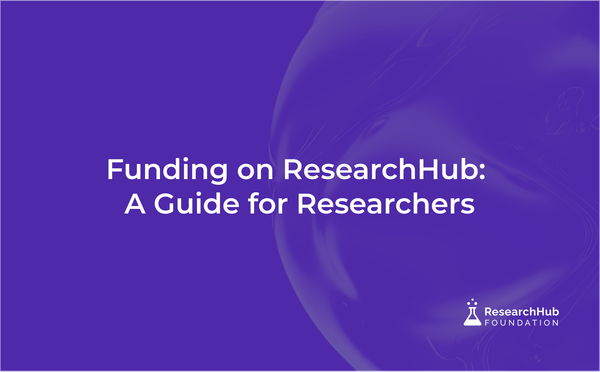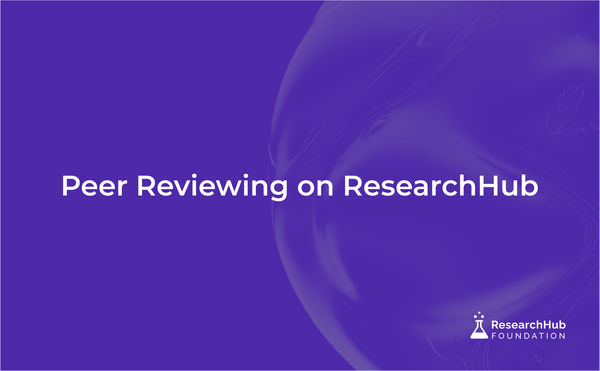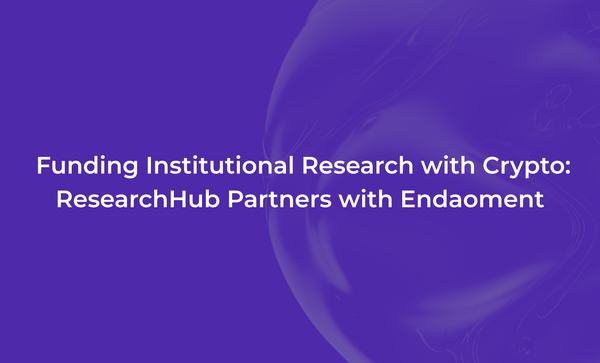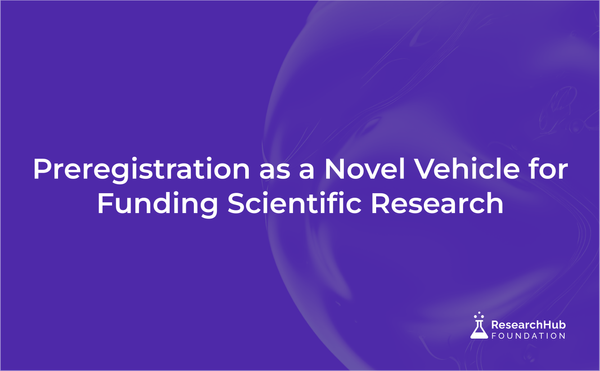The State of DeSci: An Ecosystem Overview
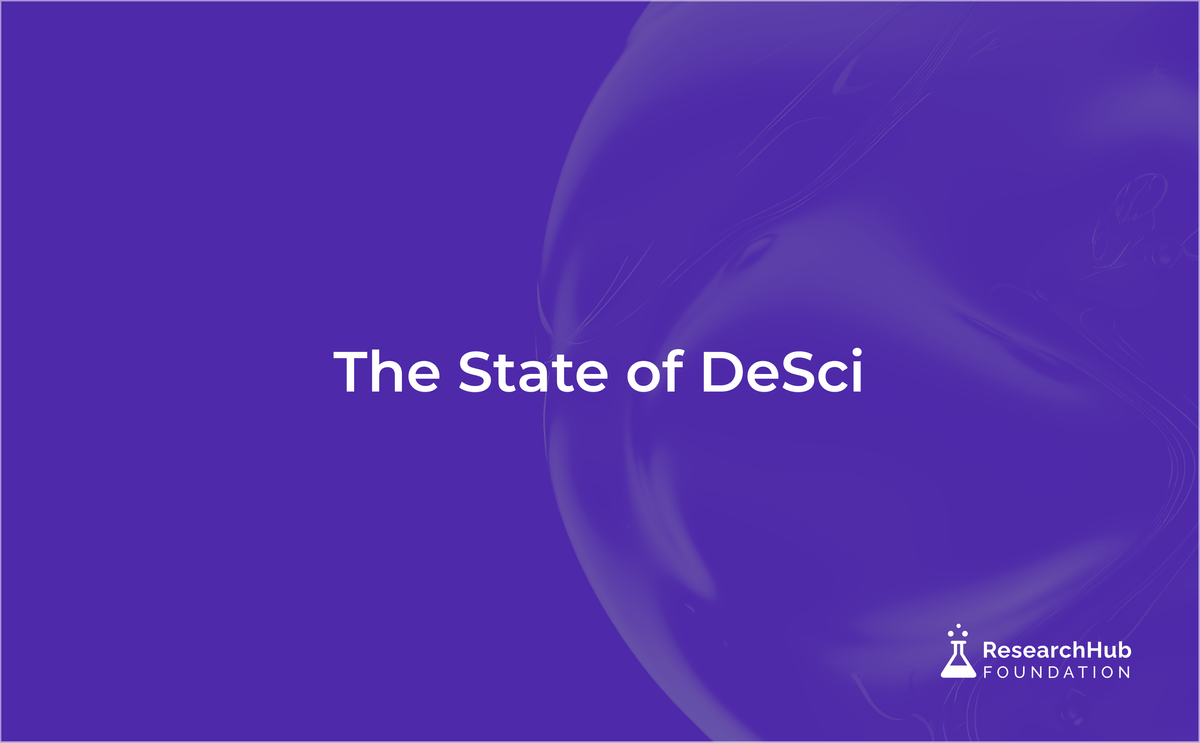
Decentralized science (DeSci) represents one of the most promising, but least understood, fields of web3 innovation. This has made it an increasing focus for everyone from serious academics and investors to citizen scientists around the world.
And while the term “DeSci” only started appearing in recent years, much of the groundwork for this field was laid in the late 2010’s, with early projects like Gene-Chain and LunaDNA representing early attempts to leverage decentralized technologies for scientific purposes. This small handful of projects has since given way to today’s vast DeSci ecosystem – an interrelated patchwork of dozens of different projects that are collectively working to democratize and accelerate scientific discovery in their own ways.
Given the diversity and ambition of today’s DeSci movement, it’s worth understanding the current state of the ecosystem and some of the major players involved. To that end, let’s unpack the main types of DeSci projects and how they are reshaping the rules of scientific progress.
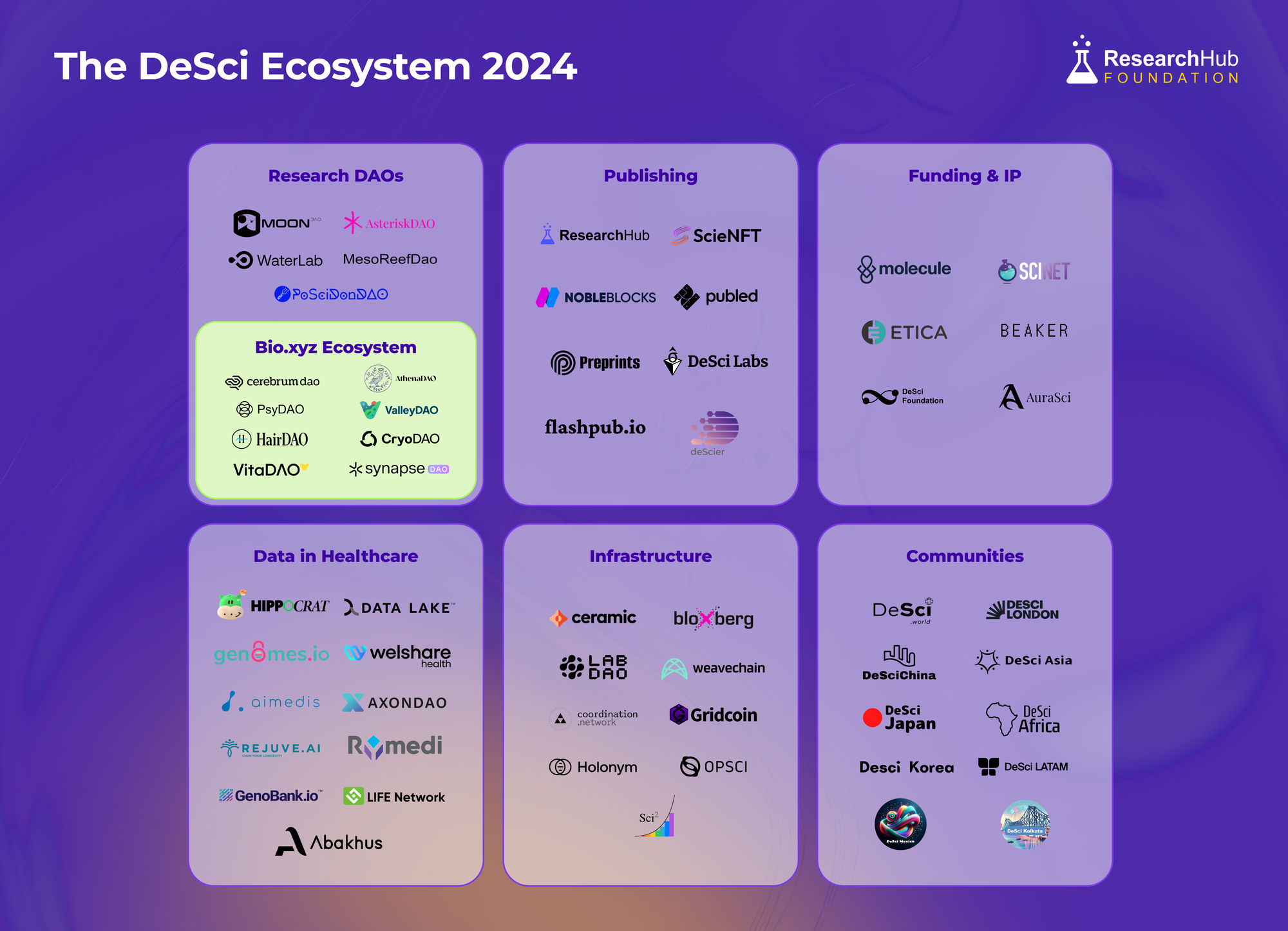
Open Publishing Platforms
DeSci publishing platforms are primarily focused on the efficient dissemination of scientific knowledge. These platforms enable the open and instant publication of new scientific studies, including all associated data sets and methodologies. Many of these platforms also feature interactive peer reviews and social collaboration tools. This approach significantly enhances research transparency and reliability while accelerating the spread of new ideas, given the slow, selective nature of traditional scientific journals.
It’s worth noting that blockchain technology is not essential for every next-gen publishing platform, and some promising publishing platforms and citation-based mapping tools have not adopted web3 features. However, these projects will likely serve as temporary, transitional bridges between the world of traditional science and DeSci, and the benefits of blockchain technology extend far beyond its ability to preserve data in a decentralized, immutable format.
For instance, platforms like RearchHub have introduced token-based reward systems that reward peer reviewers for providing expert feedback on published research. Smart contracts then automate these payments upon the completion and verification of the review, ensuring that reviewers are paid fairly and promptly. Other projects, like DeSci Labs, focus more on leveraging blockchain technology to ensure the integrity of scientific data, ensuring that all published materials are immutably recorded, making them highly resistant to censorship and loss. And as these platforms develop, we will begin to see the rise of decentralized identity and reputation systems will help eliminate information silos and gatekeepers, ensuring the seamless flow of ideas across different research environments.
Leading projects include:

Research DAOs
DeSci research DAOs (decentralized autonomous organizations) are blockchain-enabled communities that foster a more direct and participatory approach to scientific discovery. DAO members act as a collective coordination mechanism for the funding and management of scientific projects, and are typically united by their shared research priorities. For instance, some research DAOs are focused on specific fields of research, such as longevity, genetics, or environmental science, while others are more broad-based and support a wide array of scientific endeavors.
Operationally, many research DAOs implement some form of token-based governance in which community stakeholders (which can include researchers, funders, and members of the general public), hold tokens representing their voting power within the organization. This decentralized decision-making process lets the community vote on which research projects to fund, prioritize, and support. And by utilizing smart contracts, these DAOs ensure that all governance processes are transparent and immutable, reducing the administrative overhead and opaque procedures associated with traditional scientific bodies.
Leading projects include:
Funding & IP Platforms
DeSci funding & IP (intellectual property) projects leverage blockchain technology to democratize the funding, ownership, and commercialization of scientific innovations. This broad category includes platforms that issue tokens representing fractional ownership in research projects as well as projects that integrate blockchain-based grant management systems – features that have also been adopted by some research DAOs.
Many DeSci funding platforms allow community members to post bounties focused on specific scientific priorities, which scientists can then apply for and use on their research. Researchers can also solicit community funding and support for their own independent studies, thereby fostering a more participatory approach to scientific funding. This model ensures that funding is directed towards projects with broad support and aligns research efforts with the diverse interests and needs of the scientific community.
These decentralized funding mechanisms go hand in hand with scientific IP management, and many DeSci projects use tokenized assets to both fund research and protect IP. Molecule, a funding and tokenization platform for biopharma intellectual property, embodies this hybrid approach. The platform has allocated ~$2M to a wide range of research DAOs to date via their IP-NFT protocol, with an ecosystem-wide TVL of $30M. And beyond these kinds of tokenized seed investment platforms, we expect to see more decentralized secondary marketplaces that allow researchers and project funders to transfer ownership of their IP or license their rights to other investors and community members.
Leading projects include:

Healthcare Data Networks
Decentralized healthcare data networks aim to create a more secure, efficient, and equitable healthcare system by leveraging decentralized databases and collaborative research tools. These platforms facilitate the aggregation and analysis of diverse datasets – including clinical trial results, patient records, and genetic data – in a way that protects patient privacy while increasing data accessibility. This is an extremely important field given the immense value of medical data, the rise of personalized healthcare, and a growing desire among patients to have full control over the way their data is protected and shared.
Given the complexity of the healthcare industry, it’s no surprise that the goals of DeSci healthcare data networks also span a wide range of time horizons and priorities. For instance, decentralized genomic databases like GenomesDAO securely store and share historical genomic data to inform long-term drug discovery processes, while systems like Hippocrat track patient treatments and progress in real time, sharing live results privately between approved stakeholders. As this sector matures, we will likely see the increased adoption of decentralized identity systems that enable seamless and secure access to health services across different providers and jurisdictions, improving care continuity and patient experience.
Leading projects include:
Infrastructure Projects
DeSci infrastructure projects help provide the foundational frameworks necessary for other DeSci projects to flourish. These projects are creating secure, scalable, and interoperable systems that support the diverse needs of the global scientific community, including decentralized governance tools, storage solutions, and identity systems that can be recognized across various platforms and institutions. These solutions, in turn, allow other DeSci teams to focus on their core scientific objectives without getting bogged down by the complexities of setting up and maintaining back-end systems.
Current projects include LabDAO, which gives users open access to the latest bioML models and lets them run experiments without setting up and hosting their tools locally, and Coordination Network, which offers AI-powered tools for research aggregation and data extraction, proposal review and drafting, and research candidate sourcing. And beyond DeSci-specific infrastructure projects, several industry-agnostic web3 projects like Arweave and Ocean Protocol are also being used by DeSci teams to power their projects’ base architecture.
Some DeSci projects will opt to set up their own proprietary infrastructure from the ground up rather than relying on third-party services. However, there is an undeniable need for projects that offer modular and adaptable components that can be easily integrated into new DeSci initiatives, particularly as ecosystem interoperability and user-friendliness are more heavily prioritized. The key to mass DeSci adoption is making these platforms more user-friendly and valuable to the entire scientific community, even (and especially) users with no web3 experience – and DeSci infrastructure projects are essential to this effort.
Leading projects include:
DeSci Communities
Beyond the DeSci project categories explored above, the entire ecosystem is underpinned by a diverse constellation of scientific communities from across the globe. These communities, untethered to any single platform or product, comprise a wide range of researchers, developers, and ordinary individuals who interact with different projects based on their shared interests and scientific priorities.
Together, these DeSci communities play a crucial role in shaping the ecosystem by promoting new research topics, methodologies, and varying forms of support. Many actively organize conferences, workshops, and hackathons to facilitate networking and idea generation, acting as incubators for new projects and collaborations. Their grassroots efforts in advocacy and education help raise DeSci awareness and adoption, ensuring the ecosystem remains the actual needs of the scientific community.
Interested in accelerating scientific progress? Join a community:
- DeSci World
- DeSci Africa
- DeSci Latam
- DeSci Asia
- DeSci China
- DeSci Japan
- DeSci India
- DeSci Mexico
- DeSci London
- DeSci New York
DeSci: A Fluid State with Explosive Potential
DeSci encompasses a rich tapestry of interconnected initiatives, from open research and publication platforms to decentralized funding and governance models. And because the DeSci space is evolving at a rapid clip, the pace of change means that tomorrow’s ecosystem may look entirely different from today’s.
Regardless of what tomorrow brings, DeSci’s diverse ecosystem components will continue to work together to create a more open, efficient scientific landscape. DeSci is based on the premise that the scientific method of observation, experimentation, and application should be applied to the scientific discovery process itself. The projects that embody this ethos are continually pressure-testing old assumptions of how research should be conducted and shared, and their results increasingly speak for themselves.

Join ResearchHub Today.
Get In Touch
- Twitter :
- Website :
- Discord :


